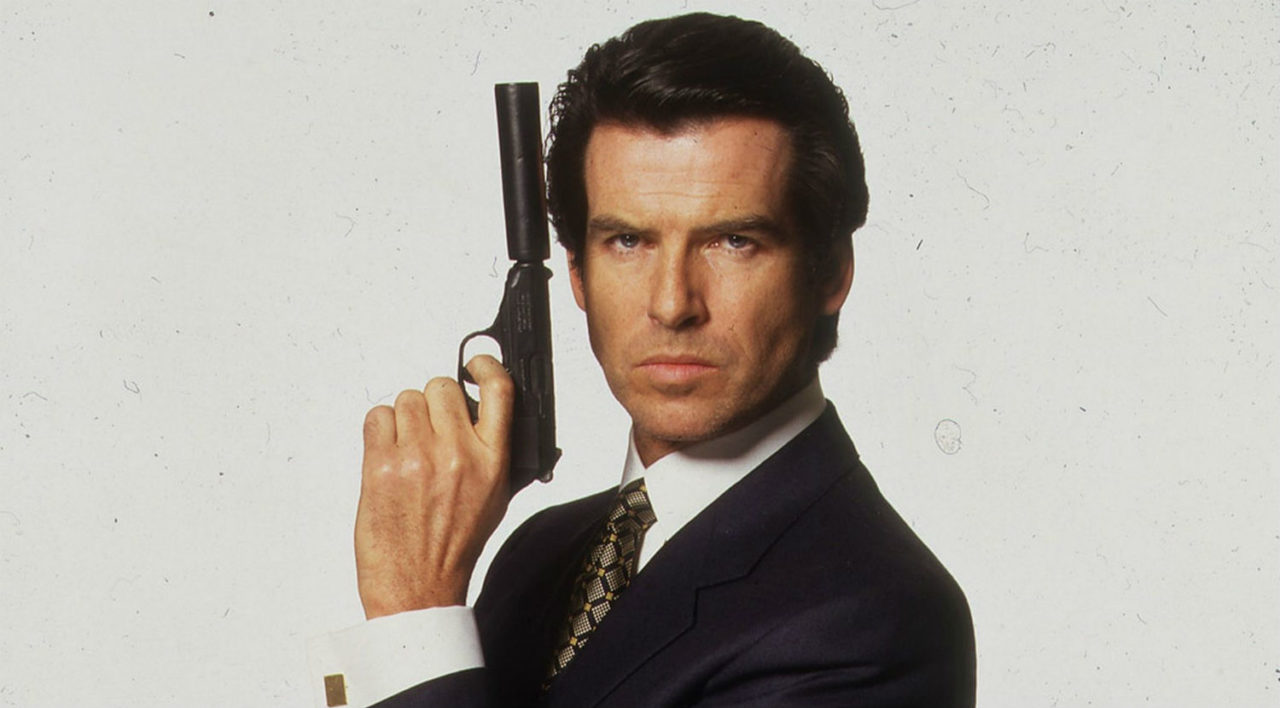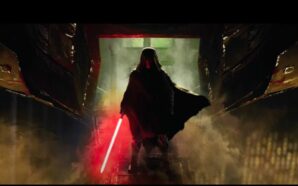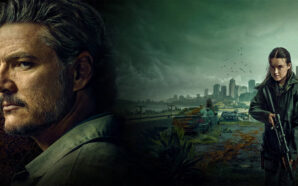I’ve always thought of Pierce Brosnan as a better Bond than his films. He joined the franchise at an interesting time; the world had changed and Bond had to change with it. James is called out as a “misogynistic dinosaur” in Goldeneye, a character out of his time and not as vital in the new global political landscape as he was at the height of the Cold War. It came down to Brosnan to pull this off, portraying a character adapting to a new world with a new boss and new antagonists. But was it “new”? That was the idea but all too soon the series seemed to revert back to the old-style of Bond film, with Brosnan’s effort seemingly being for nothing, as the scripts lazily slipped back into the comfy yet outdated formula seen in the 70’s and 80’s. I remember thinking Brosnan’s Bond films got steadily worse as they went along but is that correct? In my rewatch of every James Bond film I’ll be looking at whether our preconceptions about Brosnan’s Bond are indeed true and whether they were bad enough to warrant a gritty reboot of the series or if Brosnan and his films are an underappreciated era in the Bond canon.
Goldeneye (1995)
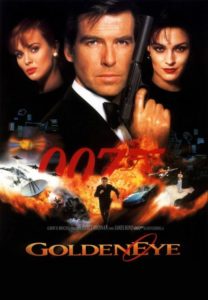 Goldeneye is fantastic. I can’t be bothered to be coy about my opinions on it because I just absolutely love it. It’s by far one of my very favourite Bond films. When I started my rewatch of the Bond series, this was the film I was waiting for and muttering, almost chanting, “Don’t worry, we’re almost at Goldeneye” when struggling to sit through the rubbish later Roger Moore films. I don’t know how to talk about it other than just list every aspect and write “love it” next to each one. But I’ll try. It’s remarkable only six years have passed since License to Kill because it feels like decades. To me Goldeneye definitely feels like the first modern Bond film and uses the Bond tropes in new and exciting ways. All the elements are here: outlandish villainous plots, gadgets, great action and Bond girls, and tonally the film balances them with the staid, creating this feeling of elevated hyper-reality which is where I feel the Bond films thrive without becoming farcical. Brosnan perfectly fits this world, a version of the character who on one hand can be deadly serious but the next joking around or romancing a woman. Every Bond actor strives for this balance but all the others have their particular strength in one or two of these areas while Brosnan is good at them all equally and I think Goldeneye might be the best example of this. The film also has two of the very best Bond girls. Natalya is neither the stereotypical nothing-but-eye-candy or the female equivalent of James Bond but instead is just a computer programmer who proves herself very capable over the course of the film and gets increasingly annoyed with Bond too, while also falling in love with him of course. And then there’s Xenia Onatopp, a villainous henchwoman who gets off on murder and squeezes the life out of men with her thighs. You can’t get more Bond than that.
Goldeneye is fantastic. I can’t be bothered to be coy about my opinions on it because I just absolutely love it. It’s by far one of my very favourite Bond films. When I started my rewatch of the Bond series, this was the film I was waiting for and muttering, almost chanting, “Don’t worry, we’re almost at Goldeneye” when struggling to sit through the rubbish later Roger Moore films. I don’t know how to talk about it other than just list every aspect and write “love it” next to each one. But I’ll try. It’s remarkable only six years have passed since License to Kill because it feels like decades. To me Goldeneye definitely feels like the first modern Bond film and uses the Bond tropes in new and exciting ways. All the elements are here: outlandish villainous plots, gadgets, great action and Bond girls, and tonally the film balances them with the staid, creating this feeling of elevated hyper-reality which is where I feel the Bond films thrive without becoming farcical. Brosnan perfectly fits this world, a version of the character who on one hand can be deadly serious but the next joking around or romancing a woman. Every Bond actor strives for this balance but all the others have their particular strength in one or two of these areas while Brosnan is good at them all equally and I think Goldeneye might be the best example of this. The film also has two of the very best Bond girls. Natalya is neither the stereotypical nothing-but-eye-candy or the female equivalent of James Bond but instead is just a computer programmer who proves herself very capable over the course of the film and gets increasingly annoyed with Bond too, while also falling in love with him of course. And then there’s Xenia Onatopp, a villainous henchwoman who gets off on murder and squeezes the life out of men with her thighs. You can’t get more Bond than that.
Despite the new, the film fits in well with the established continuity. We have a prologue set between The Living Daylights and License to Kill which sees Bond and fellow 00 agent Alec, portrayed by Sean Bean, infiltrate a Soviet base with only Bond making it out alive. The next we see Bond he’s being psychologically assessed due to him going rogue in License to Kill, fitting snugly with the canon and being a great way to reintroduce the character, especially when the scene also doubles as a car chase. Bond is then on the trail of the titular Goldeneye EMP device which he discovers has been stolen by his old friend Alec (it turns out Sean Bean isn’t dead… yet) and that he’s the head of a Russian criminal organisation looking to get revenge on Britain. On one hand he’s a bit silly but it works because of the personal relationship between him and Bond and every aspect of the film is dedicated to uncover more layers of our lead character. Bond is explored personally and professionally and the film is just as much a character reintroduction as Casino Royale. We get a new M and Moneypenny, portrayed by Judi Dench and Samantha Bond respectively, who both have more bite to them than previous incarnations. M is particularly cold and shows, almost in a meta way, how close Bond is to irrelevancy before the character, and the film, use the rest of the running time to show otherwise. Martin Campbell is a great director (I’d love to see him return for a future Bond film) and the action hits new heights that put the previous Bond films to shame and, while it’s divisive, I love Eric Serra’s score. Turning the classic Bond guitar riff into drum beats is genius. The film takes itself seriously when it needs to but can have fun along the way, Goldeneye is the Bond film all modern entries in the franchise should strive to be.
Tomorrow Never Dies (1997)
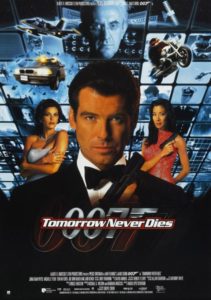 Approaching this rewatch my opinion of Brosnan’s Bond films was that they get progressively and substantially worse with each instalment but Tomorrow Never Dies ended up surprising me. It’s much closer to Goldeneye’s quality than I thought. Given all the production trouble it’s a surprise that it turned out as well as it did. In the rush to get a sequel out within two years of the last entry in the series, the script was written during filming, the director Roger Spottiswoode struggled to hold everything together and Anthony Hopkins, who was originally cast as the villain, left the production after 3 days of filming. The theme song also changed quite late in the schedule. Originally the theme was “Surrender” by K.D Lang which can be heard over the credits and parts of which are incorporated into David Arnold’s score but it was ultimately replaced with the Sheryl Crow song. Speaking of David Arnold his score is superb, mixing 90’s techno with echoes of the original John Barry compositions. Tonally the film is at the highest end of silliness that I’m okay with in a Pierce Brosnan Bond film. It’s definitely less serious and campier than Goldeneye with an added emphasis on the gadgets and quirky action, particularly during the car chase and later the bike chase, but for the most part it works for me.
Approaching this rewatch my opinion of Brosnan’s Bond films was that they get progressively and substantially worse with each instalment but Tomorrow Never Dies ended up surprising me. It’s much closer to Goldeneye’s quality than I thought. Given all the production trouble it’s a surprise that it turned out as well as it did. In the rush to get a sequel out within two years of the last entry in the series, the script was written during filming, the director Roger Spottiswoode struggled to hold everything together and Anthony Hopkins, who was originally cast as the villain, left the production after 3 days of filming. The theme song also changed quite late in the schedule. Originally the theme was “Surrender” by K.D Lang which can be heard over the credits and parts of which are incorporated into David Arnold’s score but it was ultimately replaced with the Sheryl Crow song. Speaking of David Arnold his score is superb, mixing 90’s techno with echoes of the original John Barry compositions. Tonally the film is at the highest end of silliness that I’m okay with in a Pierce Brosnan Bond film. It’s definitely less serious and campier than Goldeneye with an added emphasis on the gadgets and quirky action, particularly during the car chase and later the bike chase, but for the most part it works for me.
Plot wise the film takes elements from The Spy Who Loved Me and sees media mogul Elliot Carver manipulate world events to lead Britain and China into war and only Bond and Chinese agent Wai Lin can stop him. I really like this kind of villain. He’s basically Rupert Murdoch, and Murdoch is probably the closest we have to a real-life Bond villain, other than maybe Elon Musk, and some parts of the plot are oddly prescient with Carver blackmailing the President of the United States with some sort of revealing tape. Jonathan Pryce plays the lead and is clearly having fun, channelling the energy and performance of a Roger Moore-era baddie which just about works. There is the odd moment that pushes too far into the ridiculousness zone and I will complain that the action in the third act is repetitive with Bond shooting copious amounts of bullets fairly aimlessly. Going into this film I thought my memories of it would be better than what the film actually is but I’m happy to say I’m mistaken. Sure, it’s not as good as Goldeneye but I still think it’s genuinely pretty great and a highlight reel for why Brosnan is a great Bond. It cements his version of the character as more of an action hero and while he’s a fairly serious Bond he’s not without humour. There’s a great moment during the car chase where he does a fancy trick and we actually see Bond laugh. It’s a great moment and confirms what kind of Bond film it is: a fun one.
The World Is Not Enough (1999)
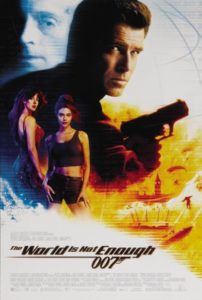 Up to this point most of my issues with the James Bond films I’ve disliked have been surrounding tone, pace and characters but fairly uniquely my main problem with The World is not Enough is the plot. Maybe it’s just because I’ve watched 19 Bond films in a row but a bad guy terrorist, the theft of a nuclear bomb and “let’s blow up Istanbul so the world has to use our oil pipeline” is uninteresting to me. The aforementioned terrorist bad guy is Renard, played by Robert Carlyle, and he has little to do during the run time but be a punching bag and say awful lines like “welcome to my nuclear family”. Although I do really like the central idea that he’s been shot in the head and the bullet will eventually kill him but until it does he gets stronger as his senses die. Keeping with the characters, in just two years we’ve gone from having a Bond girl like Wai Lin to Christmas Jones. Now, not every Bond girl has to be able to kick ass and be just as good a character as Bond but this is too far on the other end of the spectrum. Casting Denise Richards in the part of a nuclear scientist is stunt casting and obviously meant to make you think twice about characters just being included for their looks but I just don’t buy it. Not necessarily because of her looks and Tomb Raider-inspired getup but because she can’t act. She works in Starship Troopers because she’s supposed to play a vacuous character but here her performance is laughable. And to finish up my negatives, because I do have a substantial positive on the way, other than some great stunts (the boat chase on the Thames is great) the film looks very televisual and there’s a few too many jokes that fall flat.
Up to this point most of my issues with the James Bond films I’ve disliked have been surrounding tone, pace and characters but fairly uniquely my main problem with The World is not Enough is the plot. Maybe it’s just because I’ve watched 19 Bond films in a row but a bad guy terrorist, the theft of a nuclear bomb and “let’s blow up Istanbul so the world has to use our oil pipeline” is uninteresting to me. The aforementioned terrorist bad guy is Renard, played by Robert Carlyle, and he has little to do during the run time but be a punching bag and say awful lines like “welcome to my nuclear family”. Although I do really like the central idea that he’s been shot in the head and the bullet will eventually kill him but until it does he gets stronger as his senses die. Keeping with the characters, in just two years we’ve gone from having a Bond girl like Wai Lin to Christmas Jones. Now, not every Bond girl has to be able to kick ass and be just as good a character as Bond but this is too far on the other end of the spectrum. Casting Denise Richards in the part of a nuclear scientist is stunt casting and obviously meant to make you think twice about characters just being included for their looks but I just don’t buy it. Not necessarily because of her looks and Tomb Raider-inspired getup but because she can’t act. She works in Starship Troopers because she’s supposed to play a vacuous character but here her performance is laughable. And to finish up my negatives, because I do have a substantial positive on the way, other than some great stunts (the boat chase on the Thames is great) the film looks very televisual and there’s a few too many jokes that fall flat.
So, with the bad stuff out of the way, which, while I still think the film is an enjoyable watch, is most of the movie, there is one big thing I really like: Elektra. It’s clear from very early on that the writers were trying to echo Bond’s wife Tracy from On Her Majesty’s Secret Service in the relationship between Bond and Elektra. There’s a subtle reference to that film within when Elektra asks Bond whether he’s ever lost a loved one and he quickly changes the topic of discussion. The title “The World is not Enough” is even a reference to that incredible earlier film. I buy Bond’s relationship with her, having been partly responsible for her father’s death and under orders to watch and protect her, and just like On Her Majesty’s Secret Service this one has a tragic ending too. Instead of her dying, it’s revealed she’s the true criminal mastermind behind everything and as producer Barbara Broccoli perfectly puts it: “Bond thinks he’s found Tracy, but really he’s found Blofeld”. I really like this twist, even though it’s fairly obvious, and it excuses the film of making Renard’s character such a damp squib. Bond ultimately has to kill her and it’s a powerful moment, giving Brosnan time to do some serious acting which he does well instead of having him just utter quips and look cool like the rest of the script demands of him. Overall the film is merely fine and a big step down from the previous two but at its core there was some serious character drama that should have been mined further but, and prepare yourselves, the worst is yet to come.
Die Another Day (2002)
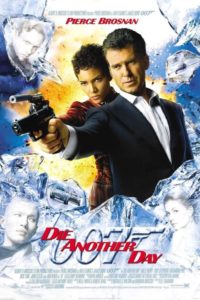 So, it turns out the Brosnan films do get worse as the go on, but the progress is far from steady. The leap in lack of quality and cringy silliness in the three years between The World is not Enough and Die Another Day is huge. It’s easily one of the worst Bond films ever made. What makes it worse is that is starts off well and holds lots of promise. We get a great action set piece aboard hovercrafts in North Korea and Bond gets imprisoned and tortured for 14 months, a fascinating concept to explore but they never go through with it. Apart from the worst Bond song ever, sung by Madonna, these opening 25 minutes or so are pretty great but then Halle Berry’s character Jinx shows up. The shift in quality isn’t her fault, although for someone who just won an Oscar she’s terrible in the film, it’s just that this is when things take a turn for the stupid.
So, it turns out the Brosnan films do get worse as the go on, but the progress is far from steady. The leap in lack of quality and cringy silliness in the three years between The World is not Enough and Die Another Day is huge. It’s easily one of the worst Bond films ever made. What makes it worse is that is starts off well and holds lots of promise. We get a great action set piece aboard hovercrafts in North Korea and Bond gets imprisoned and tortured for 14 months, a fascinating concept to explore but they never go through with it. Apart from the worst Bond song ever, sung by Madonna, these opening 25 minutes or so are pretty great but then Halle Berry’s character Jinx shows up. The shift in quality isn’t her fault, although for someone who just won an Oscar she’s terrible in the film, it’s just that this is when things take a turn for the stupid.
It turns out a fanatical Korean colonel has undergone gene therapy to turn him into a ginger white guy, created a diamond empire, received a knighthood, built an ice hotel and manufactured a huge space laser – in secret and all over the course of a year – to destroy the mine field between North and South Korea ready for an invasion. It’s not just the plot that’s dumb though. All the little details and directorial flourishes are poorly judged. There’s terrible CGI, Bond doing ridiculous stunts like kite-surfing a ginormous tidal wave away from a sun-powered death laser, copious amounts of post-Matrix speed ramping, hundreds upon hundreds of terrible innuendos, invisible car chases, ice hotels that somehow melt by just filling with water while the walls and ceilings stay solid, a cyber-suit that controls a space laser that also has a 100,000 volt taser built into it complete with Emperor Palpatine-style Force Lightning effects and a fight in a room with lasers on moving robotic arms while Jinx is also tied to an arm and flying around the room. Oh, but we do get to see the Q Branch storage room filled with old gadgets and props like the Thunderball jetpack so it’s not all bad. And for all its stupidity, and oh boy is it stupid, it can be quite fun to watch.
I feel sorry for Pierce Brosnan. Even in Die Another Day he puts in a great performance and it’s clear he’s trying to be a more serious character than the material demands. As much as I like Daniel Craig and the rebooted series, Brosnan deserved one more good Bond film and I feel sorry that people blame him for the direction his films took when it’s absolutely not his fault. It’s a shame his first film was his best and that the following three films (although the latter two much more) tainted his legacy. I would love if, after Craig’s last film, we could get a special one-off return of Brosnan to the role. A film that purposefully explores an older Bond and caps off the original timeline of the franchise. Either that or just hire Idris Elba already!
So, with Brosnan’s tenure as Bond complete, next we move onto Daniel Craig’s rebooted era of the franchise which I’ll cover in two weeks time. Are you a Brosnan fan and who’s your favourite James Bond? Let me know in the comments and geek out with me about TV, movies and video-games on Twitter @kylebrrtt.




